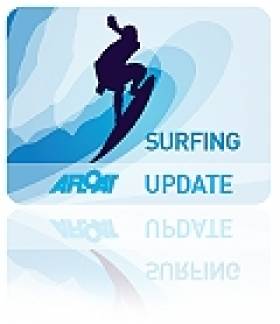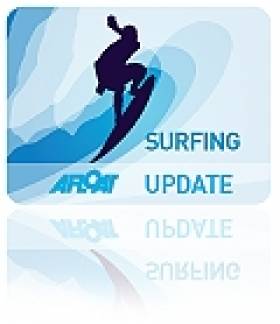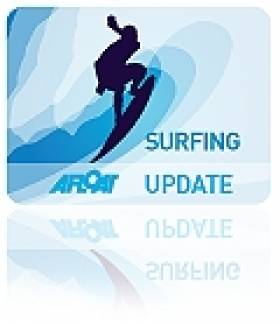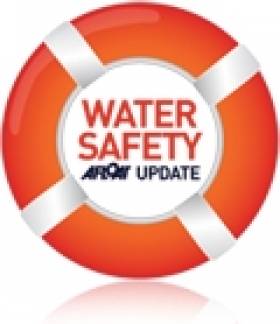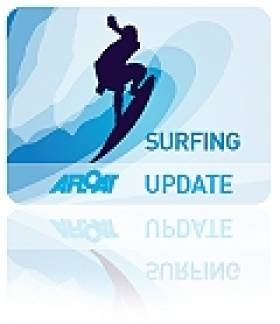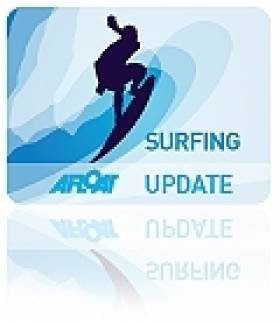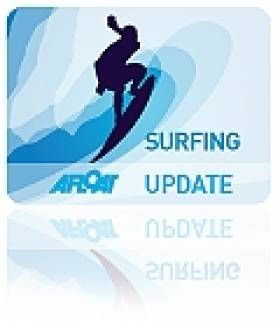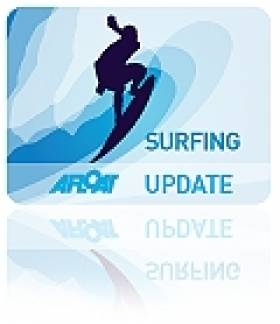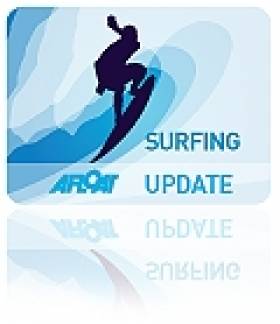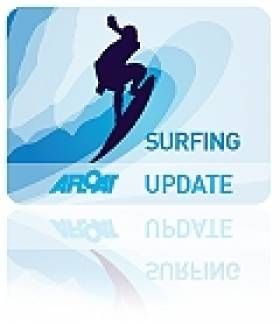Displaying items by tag: Surfing
Surf Pro Easkey Britton Relates The Shape She's In
#Surfing - Irish surfing 'game changer' Easkey Britton shares some of the secrets of her day-to-day life with the Irish Examiner's 'Shape I'm In' column this weekend.
Britton - who made waves last year via a film that documented her history-making surf trip to Iran - is constantly busy, which her post-PhD work in sustainable fisheries taking her away from home a lot.
But the 28-year-old seems able to manage it all and stay grounded thanks to the benefits of surfing, which keeps her physically and mentally strong.
The Irish Examiner has more on the story HERE.
Prowlers Surf Well Worth The Wait For Big Wave Riders
#Surfing - The Irish Times was on hand earlier this week to capture six daring surfers' excursion to the secret swell spot known as Prowlers.
Big Wave Award contender Kurt Rist was among the group who had waited three years for the return of the rare surf phenomenon off Mullaghmore Head in Co Sligo, which is only accessible to the hardiest waveriders by Jet Ski tow-in.
Discovered in 2006, Prowlers was only captured on camera for the first time in late 2010 - and videoed again this past Monday 3 March as Rist and company took up the challenge. The Irish Times has more HERE.
Speaking of rare waves, Red Bull recently highlighted some never-before-seen snaps by student Christian McLeod of Rist and others surfing nearby west coast slab The Unfound.
And MagicSeaweed has also celebrated the 'grit and guts' of the Mullaghmore regulars, particularly this stunning display by Newquay surfer Tom Butler (beware the NSFW audio):
Tom's Bomb by Peter Conroy from MSW on Vimeo.
Further afield, Ireland can hail the exploits of Lahinch resident and 'adopted Clareman' Tom Lowe, who last month became the first European to surf Mexico's notorious Killers, according to the Irish Examiner. Check out the video evidence:
Shore Shots Surf Film Fest Returns Next Month
#Surfing - Following last year's successful inaugural event, the Shore Shots Irish Surf Film Festival is returning in 2014 to the appropriately named Light House Cinema in Dublin's Smithfield on 5-6 April.
After one of the best winters on record for Irish surfing, surfers from across the island will be gathering for two days in the capital to check out the latest waveriding adventures as seen through the lens of filmmakers and photographers.
Among the line-up of hotly anticipated surf edits from the country’s best surfers and film-makers, photography and video from around the globe will be screenings of Uncharted Waters, a profile of 1960s Aussie surfing legend Wayne Lynch, and The Old, The Young and The Sea, a road movie following Europe's premier surfing route from France to Portugal.
And a weekend celebrating Ireland's second ever surfing themed film festival wouldn't be complete without the now infamous Shore Shots Afterparty, hosted across Smithfield Square at the Generator Hostel.
For more on the festival and how to book tickets for screenings and the afterparty, visit the Shore Shots website HERE.
RNLI Surfers Survival Clinics Return To The Causeway Coast
#WaterSafety - The RNLI will host four free Surfers Survival Clinics next weekend, Saturday 8 and Sunday 9 March, on the East Strand in Portrush.
The clinics, which are run by the charity’s lifeguards, are open to surfing enthusiasts of all abilities and are aimed at developing both knowledge and skills in surf safety.
The RNLI programme, which is now being run for the third year in Northern Ireland, will show surfers how to develop their rescue techniques, learn basic first aid and surf etiquette and learn them how to help themselves and others if they get into trouble in the surf.
More people are taking to the sea every year for enjoyment and the Causeway Coast is a popular area for water sports including surfing and body boarding. The clinics have proved popular with surfers who use them as a chance to brush up on their knowledge and skills and pass on their experiences to others.
There are 10 seasonal RNLI lifeguarded units in Northern Ireland, each equipped with lifeguards ready to respond in the event of an emergency. RNLI lifeguards aim to reach any casualty up to 300m from shore within the red and yellow flags within three and a half minutes. Lifeguards are also on hand to provide advice and assistance to all water users.
Last year, Northern Ireland experienced one of its hottest summers for years and this was reflected in a busy season for the lifeguards located across the Causeway Coast in Co Down.
In all, RNLI lifeguards responded to 302 incidents compared to 159 in 2012 and came to the aid of 330 people who found themselves in difficulty, which is an increase of 153 from the year before.
The Causeway Coast, where there are seven units, was the busiest area, with lifeguards responding to 222 incidents and assisting 247 people.
Speaking ahead of next weekend’s clinics, RNLI lifeguard supervisor Tim Doran said: “Surfers of all abilities will benefit from the Surfers Survival Clinic. Amateur surfers will get the chance to learn safety skills, duck diving and surf etiquette which should help them minimise any injuries should they get into trouble.
“The more experienced surfer will be shown rescue and first aid demonstrations so that they can continue developing their skills in the surf.”
Spaces are limited for each session so advance booking is essential to avoid disappointment. Anyone who wishes to take part in the RNLI’s Surfers Survival Clinic should be aged 18. To book a space or for more information contact Tim on +44 (0) 77 899 25998.
Mullaghmore Surf Produces More 'Big Wave Award' Contenders
#Surfing - Cornish surfer Tom Butler is in the running for this year's Billabong XXL Big Wave Awards thanks to this stunning ride under the crest of a giant wave off Mullaghmore Head in Co Sligo earlier this month, thanks to Storm Brigid.
But he's not the only one staking his claim in the 'Ride of the Year' category, as Ireland's Easkey Britton contributed her own Mullaghmore tube run last December.
American waveriders Will Skudin and Kurt Rist caught similarly massive swells over the Hallowe'en weekend, preceded just days before by Capetonian surfer Barry Mottershead's spectacular slide.
Less auspicious among these efforts was Peter Craig's collapse under a sudden wave break - not surprising up for 2014's 'Wipeout of the Year'. Let's see that again:
Funding Gives A Boost To NI's First Autism Surf Club
#Surfing - A Portrush surf school will continue its links with a programme encouraging social inclusion for people with autism thanks to a funding award from Sport Northern Ireland.
As the Coleraine Times reports, the £3,750 (€4,536) award goes to Outdoor Recreation Northern Ireland, whose partnership with Autism Initiatives NI led the latter to establish ties with the Alive Surf School, recently voted 'Best Family Activity Provider' in the OutdoorNI Awards.
That connection resulted in the North's first surfing summer club specifically for people on the autism spectrum, coming after the similar Surf2heal programme in the Republic that uses surfing as powerful therapy for autistic children.
And the new NI programme is set to continue this summer thanks to the latest funding, which has allowed for the purchase of two custom-built tandem surfboards.
The Coleraine Times has more on the story HERE.
Spider Bite Puts Irish Surfer In The Hospital
#Surfing - Champion Irish surfer Craig Butler was forced to cut a recent African waveriding trip short after falling victim to a spider bite.
As the Irish Independent reports, 20-year-old Butler received a bite from a false widow spider that left him dizzy and nauseated within a matter of hours.
Though not normally fatal, bites from these venomous arachnids - which are increasingly common in our more northern climes - can become infected and lead to serious complications.
That's the case with Butler, who returned to Ireland with a hugely swollen foot that prompted his concerned GP to refer him immediately to hospital.
As of yesterday morning, the multi-time Irish surfing champion from Tramore had been on a trolley at Waterford Regional Hospital for some hours awaiting a bed - and his appointment under the surgeon's knife.
It's not the first time he's dealt with a serious infection, after skipping treatment for a leg wound while surfing in France two years ago.
The Irish Independent has more on the story HERE.
Portrush Best For Kids In NI Surf Spot Polls
#Surfing - Two popular surfing spots on Northern Ireland's north coast have been selected as the best for kids by OutdoorNI.
According to the Coleraine Times, Alive Surf School in Portrush has been named 'Best Family Activity Provider' in the latest OutdoorNI Awards, receiving a third of all votes from Facebook users throughout December.
It marks the third year in a row that the Co Derry surf school has received the accolade, and was described by Alive Surf School owner Ricky Martin as a "fantastic achievement".
Meanwhile, the Londonderry Sentinel reports that the Long Line Surf School, just west along the coast in Benone, was named 'Best Coastal Experience' for its 'Kids Big Day Out' service.
As owner Dan Lavery explains, the day-long experience on Fridays during school holidays incorporates education with fun games and shore-based exercises, and "is all about encouraging young ones to experience surfing as a lifestyle rather than just a sport."
In other NI surfing news, the Causeway Coast Surf Club in Portrush is coming off the back of its most competitive year yet, says the News Letter.
Five national titles, and a haul of 16 medals - many in the relatively new discipline of Stand Up Paddleboard - marked the end of a "tremendous" year for the club, said chair Gerald McAuley.
"It says much for the quality of surfing here in Portrush and Northern Ireland," he added. "We hope this continues in 2014."
'Victory At Sea' As Surfer Cotty Awaits Biggest Wave Record Confirmation
#Surfing - Mullaghmore regular Andrew Cotton is waiting to hear if he has snagged the world record for surfing the biggest wave in recorded history.
As the video above shows, Devon surfer Cotty was simply dwarfed by the giant swell off Nazare in Portugal on Sunday 2 February, in the same location where friend and rival Garrett McNamara clinched the world record in November 2011.
Just a month ago Cotty was tackling 50-foot waves off the Sligo coast - and as Surfer Today reports, he's now claiming "victory at sea" after surfing what the UK media is calling an 80-foot monster wave.
But we'll still have to wait and see if the record is made official.
More Big Surf On The Way As 'Storm Brigid' Sweeps In
#Surfing - Just weeks after the 'black swell' that brought surfers in their hundreds to the West of Ireland's top surfing spots, Surfer Today reports that its sequel storm system is in the making over the Atlantic.
Taking a more direct route than the devastating Winter Storm Hercules (or Christine as it was better known here in Ireland), the new weather system known as Storm Brigid is "on a steady eastern track" towards Europe.
And the respective southwest coasts of Ireland and England are expected to bear the brunt of its force, with waves of up to 40 feet predicted.
The news comes in the same week that Donegal recorded its biggest ever surf in the form of an 80-foot monster wave dubbed 'Growlers'.
However, like earlier this month, even the hardiest waveriders won't be taking their chances till the severe conditions turn down a notch!



























